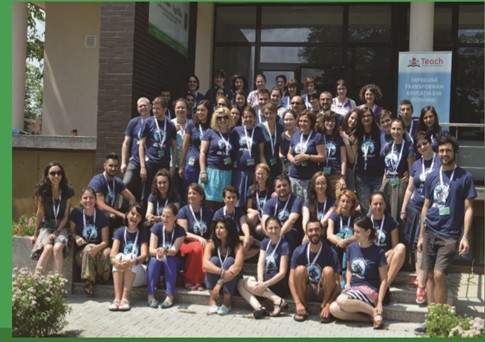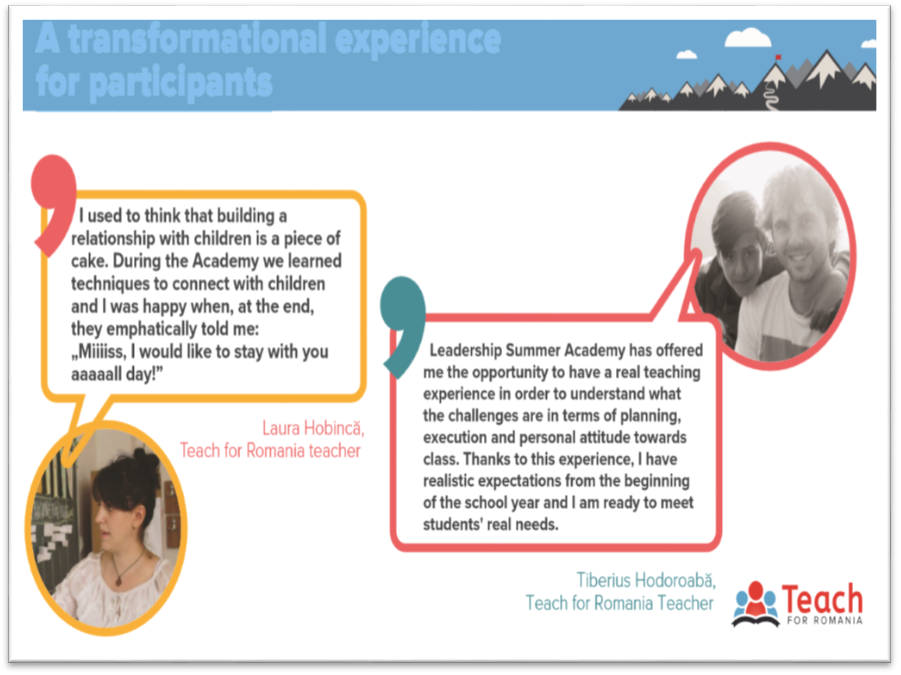Abstract
The goal of this study is to put into emphasis the elements that bring value and quality into the educational services that are dedicated to underprivileged environments, where the Teach for Romania (TFR) teachers are running their activity. The lack of qualified teachers is a challenge that several european countries are facing. This research brings to surface aspects related to the training of trainees held in each Leadership Summer Academy by TFR, for all new talents that were recruited to be part of the educational system for a minim 2 years period. Trainee-teachers are professionals who effectively achieve the desired results with their students. In our country, the educational system needs to allow professionals from various backgrounds to easily make the transition into teaching if demonstrating the necessary commitment and capacity to become high-quality teachers. The more variety exist in the teaching area, the more know-how will be present in schools and across the education system. At this time, Teach for Romania NGO is the only one which promotes and provides specialized trainings in order to sustain the reconversion process for the new entry teachers. Leadership Summer Academy (LSA) can generate together with the TFR’s other approaches, an alternative pathway for the reconversion into the educational system, in order to develop a systemic change needed to realize the goal of an excellent and equitable education for all children.
Keywords: Inclusive education`Teach for Romaniatrainee-teacherseducational serviceseducational leadership
Introduction
Across all european countries, the main goal of education systems is to provide an equitable education to all students. In order to achieve that, it is necessary to bring all the stakeholders effort together, due to the fact that it is quite difficult to find the best pathway for the teachers that are recruited, selected, trained, retained, and supported in every country (Mckinsey, 2017).
In Romania, for the past five years, Teach for Romania is the only NGO that every summer best talents are selected and then, it provides a six weeks program in order to train a new generation of teachers.
The Leadership Summer Academy
The most powerful transformational experience for leadership and basic training in Romania, a program which develops leadership competences through an unique learning experience:
about self-development
about education/teaching,
about the power of a community.
The trainee-teachers
The trainee-teachers have different backgrounds, including academic or professional areas other than the pedagogical field. They are recruited in order to bring added value in today’s rapidly evolving social and technological environment and also to bring additional value to the labor market. Furthermore, the trainee-teachers come from all over the country, with different ages (Figure

Problem Statement
We often support instructors in creating teaching philosophy statements, and various resources exist to support their development (Schonwetter, Sokal, Friesen, & Taylor, 2002). However, few resources are available to help in preparing educational leadership philosophy statements.
Leadership Summer Academy is a place full of resources for a transformational journey to the field of education and leadership. The main three objectives that TFR decided to implement for the trainee-teacher are:
activate their leadership potential and make deliberate practicing on their personal strengths, working with personal saboteurs, self-reflection, integrating feedback, taking initiative;
develop basic teaching abilities (planning, effective execution, assessment, classroom management);
building the best way to learn and practice within TFR community.
Firstly, I will present the five skills that will be achieved by the end of the boot-camp training for every trainee.
Self-leadership:
The ability to make transformations in yourself after an introspection and feedback process.
Resilience:
The ability to adapt and recover from a difficult and/or long term situation.
Critical Thinking:
The intellectually disciplined process of actively and skillfully conceptualizing, applying, analyzing, synthesizing, and/or evaluating information gathered or generated by observation, experience, reflection, reasoning or communication, all as a guide to belief and action (Scriven & Paul, 1987).
Social effectiveness:
The ability to generate positive change and build partnerships with different people.
Strategic thinking:
The manner in which people think about, view, and create the future for themselves and others (Bradford, 2018.
Research Questions
From the TFR perspective of the training system the following main research question is how the team can put the objective and competence in the correlated activities, in order to have the best outcomes for all the trainees. For all three objectives we should find how can we lay the foundation of the reflection process and personal leadership development, how can we build a teaching and a working process with children from vulnerable communities and of course, how can we build the framework for direct involvement in transforming education in Romania.
Purpose of the Study
The purpose of this study is to present Leadership Summer Academy´s boot-camp, an instrument that belongs to Teach of Romania and that is active for 5 years already, as a positive example and effective method to attract and increase the number of new teachers, people with great professional experiences. In addition to that, the study´s goal is also to present the range of activities and actions that help to build up that competences and achieve the professional objectives that the team of trainee teachers strikes for, generation by generation.
Research Methods
This study explores the research problem of the lack of the talents in education, being an exploratory fundamental research. In this study I used documents, facts or information already available and I analyzed subjects in order to make a critical evaluation of the instrument that TFR is using for the new talents in teaching. I had the opportunity to study all the documentation of the program, due to the fact that I’m already an alumni of it (Saunders, Lewis, & Thornhill, 2012).
Findings
The most important five competence were selected by the Training and Support Team in order to have a holistic vision implemented for all the participants. In the table below, there are are centealised the competence and the correlated action (Table
Conclusion
Either if it is about the role of attracting new talents in teaching, or about developing teaching and leadership skills, Leadership Summer Academy is a boot-camp that offer a foundation for a mentality that is specific to future leaders in education: courage to face obstacles, desire to make a difference, resilience and self-analysis capacity, solution orientation.
Leadership Summer Academy as an instrument of attracting new talents in teaching
This year, the fifth edition of this program took place and the number of the partcipants is increasing, confirming the strategic objectives of the organization. Therefore, in 2018, LSA in numbers shows the following:
60 teachers,
400 students,
-
20 mentors (alumni, teachers)
-
6 tutors/trainers – TFR,
-
14 trainers - friends/partners
The efficiency of the program is given also by the very well-structured agenda of every day spent in the L.S.A. as it can be seen in the table
Leadership Summer Academy as training for developing teaching and leadership skills
The evaluation process for the trainee-teacher that will remain in the educational system has 4 dimensions:
Basic teaching
Self - Reflection
Integrating feedback for self-improvement
Building relationships
Final decisions are made at the end of the assessment center with evaluators scoring individual exercises, then competencies, and then assessing the overall profile of each candidate and their potential to create impact. All selection activities are conducted by rigorously trained assessors, who have training related to building long term knowledge, self-guidance and observed practice. All programs also have quality control mechanisms, where difficult or questionable decisions can be reviewed by more experienced assessors. LSA is a transformational experience for all the participants and every year there are testimonials supporting this, appearing in online press (Figure

References
- Bradford, R. (2018). Backgrounder: Strategic Thinking: 11 Critical Skills Needed. Retrieved from: https://www.cssp.com/CD0808b/CriticalStrategicThinkingSkills/
- Mckinsey. (2017). Backgrounder: Drivers of Student Performance: Insights from Europe. Retrieved from: https://www.mckinsey.com/industries/social-sector/our-insights/drivers-of-student-performance-insights-from-north-america
- Saunders, M., Lewis, P. & Thornhill, A. (2012). Research Methods for Business Students. 6th edition, Pearson Education Limited.
- Schonwetter, D.J., Sokal, L., Friesen, M., & Taylor, L.K. (2002). Teaching philosophies reconsidered: A conceptual model for the development and evaluation of teaching philosophy statements. International Journal for Academic Development, 7(1), 83-97.
- Scriven, M., & Paul, R., (1987). Backgrounder: National Council for Excellence in Critical Thinking. Retrieved from:https://www.criticalthinking.org/pages/defining-critical-thinking/766
Copyright information

This work is licensed under a Creative Commons Attribution-NonCommercial-NoDerivatives 4.0 International License.
About this article
Publication Date
15 August 2019
Article Doi
eBook ISBN
978-1-80296-066-2
Publisher
Future Academy
Volume
67
Print ISBN (optional)
-
Edition Number
1st Edition
Pages
1-2235
Subjects
Educational strategies,teacher education, educational policy, organization of education, management of education, teacher training
Cite this article as:
Manea, N., & Purcaru*, M. (2019). A Path For New Talents In Teaching: Leadership Summer Academy. In E. Soare, & C. Langa (Eds.), Education Facing Contemporary World Issues, vol 67. European Proceedings of Social and Behavioural Sciences (pp. 1152-1157). Future Academy. https://doi.org/10.15405/epsbs.2019.08.03.141
